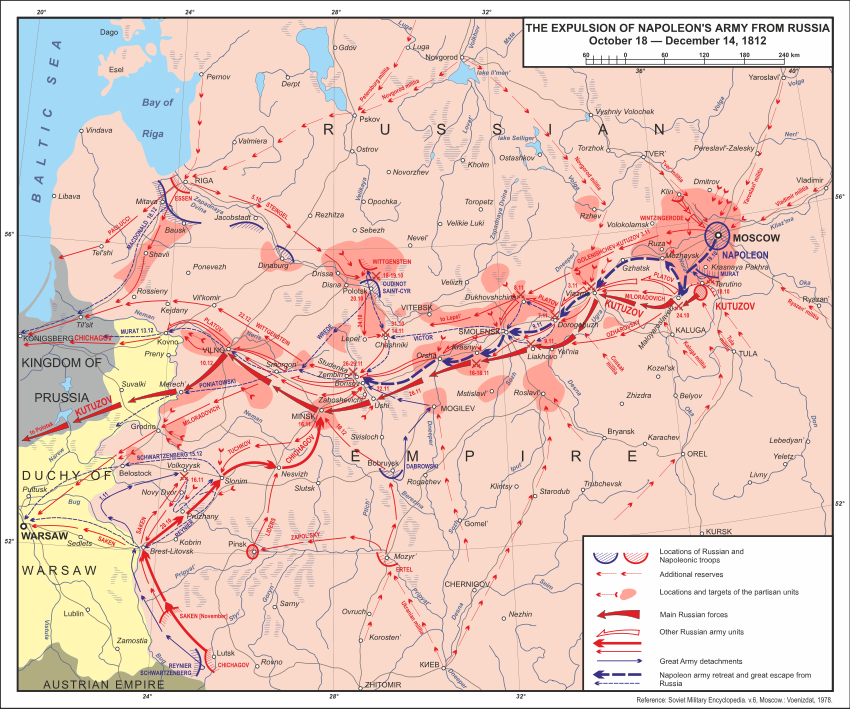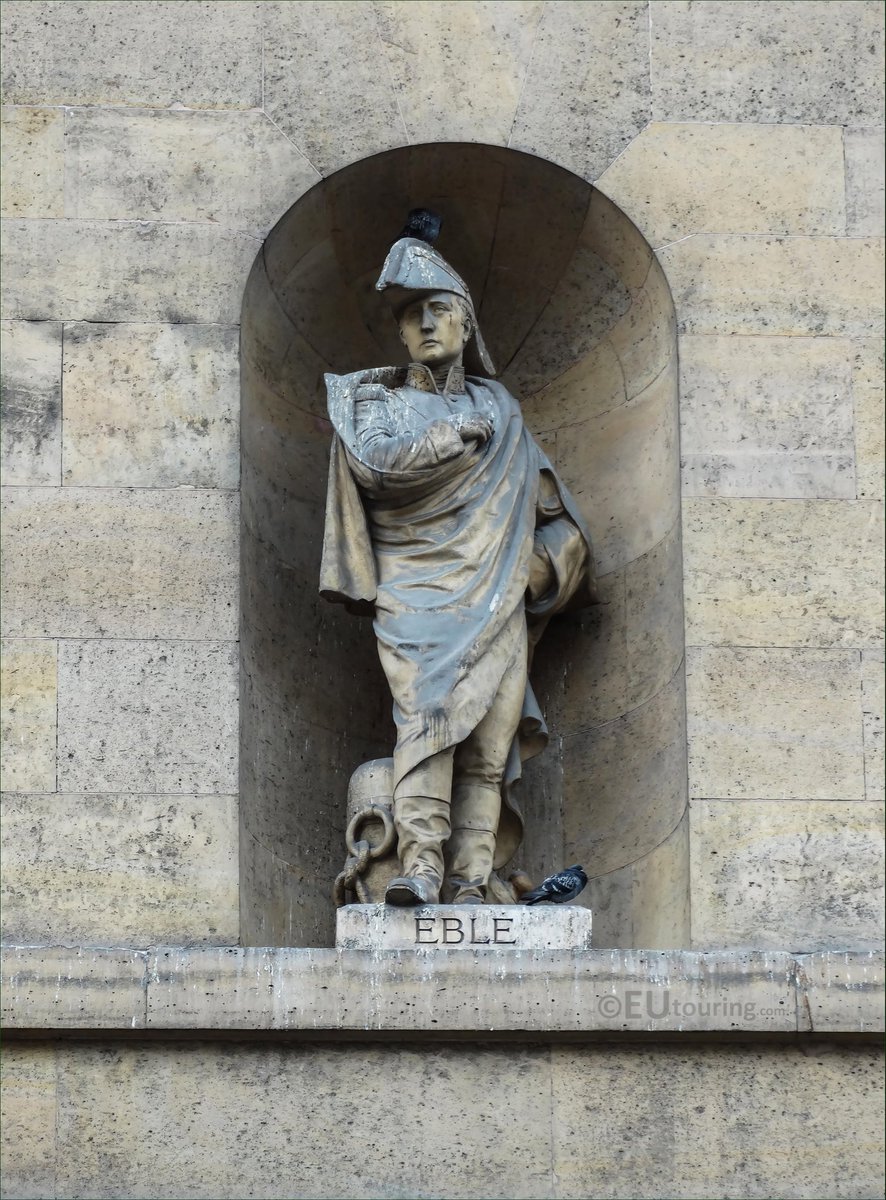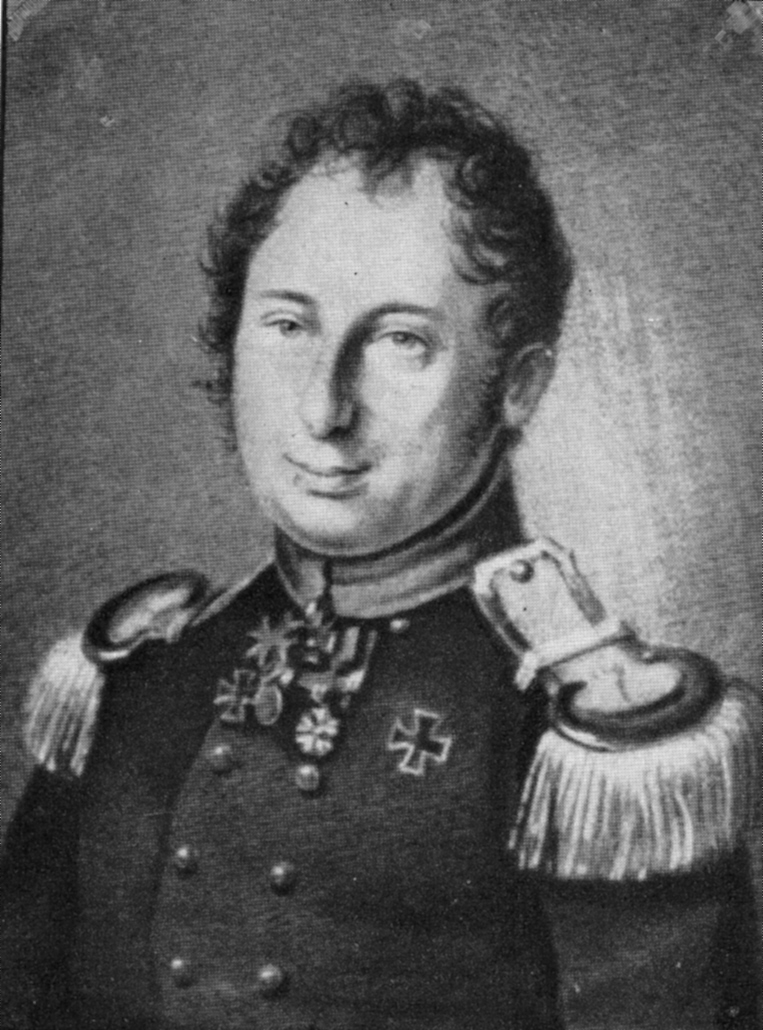
#OTD 1 January, 1813, Yorck and Massenbach's letters finally reached Macdonald, the news of which prompted Murat to abandon Königsberg.
As the last of the French army in Russia began fleeing, Vilna celebrated the auspicious beginning of the New Year.
#Voicesfrom1812
As the last of the French army in Russia began fleeing, Vilna celebrated the auspicious beginning of the New Year.
#Voicesfrom1812

Between the night of 31 December to 1 January, the Prussians remaining at Tilsit began to demand money from Macdonald. The marshal, exercising the remainder of his dignity, gave out "about half, or perhaps a third, of the sum demanded," leaving the rest to the local government.
But their commanders kept coming back, asking for more, as much as 1,500 to 2,000 francs.
Having no authority to access the levies from Courland, Macdonald first "put a good face on the matter and dissimulate," but was eventually forced to give out his own money.
(Macdonald)
Having no authority to access the levies from Courland, Macdonald first "put a good face on the matter and dissimulate," but was eventually forced to give out his own money.
(Macdonald)
At dawn of the year 1813, he was wrapped in his fur-lined cloak, trying to catch some sleep after four nights on the qui vive.
But Colonel Marion of the Engineers woke him up, saying:
"I congratulate you, Monsieur le Maréchal, you have at last received news of General Yorck...
But Colonel Marion of the Engineers woke him up, saying:
"I congratulate you, Monsieur le Maréchal, you have at last received news of General Yorck...
I fancied you had; for, as in accordance with your orders, I was testing the ice, I saw all the Prussians rapidly recrossing the Neman. I thought you had sent them to meet the rearguard, General Massenbach, as he passed by me, gave me these two letters."
They were the letters from Yorck and Massenbach, written respectively on the 30th and the 31st.
"Good heavens!... we are betrayed-perhaps given up; but we will sell our lives dearly," Macdonald exclaimed in horror.
(Macdonald)
"Good heavens!... we are betrayed-perhaps given up; but we will sell our lives dearly," Macdonald exclaimed in horror.
(Macdonald)
He "saw all at once his force reduced from 29,000 to 9,000," a predicament which he did not conceal from the French, Polish, and Westphalian troops remaining at Tilsit. It rather freed him from "the state of anxiety he had been living for the last two days."
(Segur, Macdonald)
(Segur, Macdonald)
He immediatealy mustered those men and ordered a forced march to Lobinau across the Forest of Bömwald, with a promise of "a month's extra pay" should they reach Danzig in safety.
There still was a Prussian battalion whom Massenbach had forgotten to inform of the convention.
There still was a Prussian battalion whom Massenbach had forgotten to inform of the convention.
Approaching their officer, unable to speak French and clueless about the turn of events, Macdonald expressed his gratitude for "their zeal, fidelity, and attachment." Handing him 600 francs from his own pocket, he courteously let him know of the situation.
When the officer was told that he was free to join his compatriots, he "turned pale, and shed tears of indignation," and begged to join the French; he had to be persuaded to leave the army.
Then began 22 hours of march "in rain, through water, and in pitchy darkness."
(Ibid)
Then began 22 hours of march "in rain, through water, and in pitchy darkness."
(Ibid)
On the way, Macdonald was stopped by a Russian and Prussian parlementaires. The former, actually a Frenchman who had served as an aide-de-camp to Moreau, invited the Marshal to an interview. When he demanded Macdonald to lay down his arms, he refused.
Sensing a poorly devised trap, Macdonald informed him that his corps was in retreat, and that he would be willing to meet him again on the next day.
The forced march continued, during which the marshal notified Murat of his situation.
The forced march continued, during which the marshal notified Murat of his situation.
The loss of Prussia as an ally, which had served to contain Russia's encroachment on the Vistula, prompted the King of Naples to abandon his post for his throne at home. With destitution reigning in the camp, and with Davout away, there was no one to counter his rash decision.
Deploring the conditions which they had been subjected to, many "indulged in language which was almost seditious."
Such opinions proved contagious, for even Ney "could no longer restrain himself" and blamed Napoleon for "the abyss of destruction."
(Thiers)
Such opinions proved contagious, for even Ney "could no longer restrain himself" and blamed Napoleon for "the abyss of destruction."
(Thiers)
At the time, Berthier had become too ill to make any interposition.
All at once, Murat announced that the army will quit Königsberg and abandon the entire Neman, for they had ceased to function as their easternmost line of defense.
(Fain, Thiers)
All at once, Murat announced that the army will quit Königsberg and abandon the entire Neman, for they had ceased to function as their easternmost line of defense.
(Fain, Thiers)
Marbot, one of the first to recross the river separating the Duchy from Red Russia, wrote:
"From the spot where we crossed the Vistula my regiment proceeded to the little town of Sweld , where it was cantoned before the war, and there I began the year 1813."
"From the spot where we crossed the Vistula my regiment proceeded to the little town of Sweld , where it was cantoned before the war, and there I began the year 1813."
Leaving the garrison of Grandenz, where he had stopped short in the summer of 1812, he mused about the chief causes of the failure of Napoleon's grand enterprise.
The foremost was the waging of a two-front war on the northern and southern antipodes of Europe.
The foremost was the waging of a two-front war on the northern and southern antipodes of Europe.
This dangerous lack of focus led to a permanent lack of seasoned French troops, which Napoleon, "like diluting generous wine with dirty water," tried to supplement with allied troops of lower caliber.
(Marbot)
(Marbot)
The second but "not less fatal" cause was "the bad organization, or rather total want of organization, in the conquered countries." Unlike "in the campaigns of Austerlitz, Jena, and Friedland," the army was unable to "form from post to post regular communications."
This led to a negative spiral of events. Notwithstanding the lack of stable supply depots, hospitals, and postal stations between the Neman and Moscow, and that leading to the extreme norths of Polotsk and Riga, Napoleon had "imprudently pushed onto Moscow."
As a result, "[t]wo hundred leagues of country were thus given over to wandering bands of Cossacks," leaving the rear permanently exposed to spontaneous raids. Each field hospital was evacuated at the last minute, sentencing the patients to captivity.
In this way, each loss suffered by the rearguard gradually constrained the army's capacity to reconnoiter, making those in the periphery increasingly vulnerable to sudden onslaughts of the Cossacks-starting from the skirmishes at Inkovo and Mir up to the Berezina.
Lastly, Marbot argued that "[t]he lack of interpreters also did us more mischief than might be supposed." Citing Partouneaux's critical failure to communicate with the peasants' guide at Borisov, who could have pointed to right direction, he argued:
"I insist upon this point because, though the French army is that in which there is the least knowledge of foreign languages, and great inconvenience has often resulted therefrom, this has never corrected us of the carelessness with which we treat a matter so essential in war."
The New Year thus began with the disappointing announcement the sojourn of the army would only be over beyond the Vistula and the Elster.
Vionnet, who had reached Königsberg just a day ago, must have been shocked to hear that everyone "would be leaving on the 2nd of January."
Vionnet, who had reached Königsberg just a day ago, must have been shocked to hear that everyone "would be leaving on the 2nd of January."
Bourgogne, in relatively safety in the town of Elbing, took a bath and wished his comrades a Happy New Year.
He was delighted to meet two men from his company who had not been seen since the crossing of the Berezina. One of them even brought a New Year's gift for him:
He was delighted to meet two men from his company who had not been seen since the crossing of the Berezina. One of them even brought a New Year's gift for him:
"Why, sergeant, I have something to hand over to you! You remember that when we were leaving Moscow you entrusted me with a parcel? Here it is just as you gave it me; it has never been taken out of my knapsack."
It was full of his loots from Moscow.
It was full of his loots from Moscow.
"The parcel consisted of a military overcoat of fine dark-grey cloth that I had had made for me during our stay in Moscow by the Russian tailors whose lives I had saved, and...an inkstand...that I had taken from a table in the Rostopchin Palace..."
He put on the new coat and became doubly jubilant at what he found in its pocket-an Indian silk handkerchief and a cardboard box with five rings!
Now he knew what gift to give his hostess, Madame Gentil.
"The year was beginning well for me," wrote Bourgogne.
Now he knew what gift to give his hostess, Madame Gentil.
"The year was beginning well for me," wrote Bourgogne.
For the Oudinots, the New Year's gift must have been their timely arrival in Berlin:
"We alighted, at five o'clock in the evening, at the Hôtel de Russie in the Unter den Linden."
But their joy shrank at the sight of "the famous and ominous 29th Bulletin."
(Eugenie Oudinot)
"We alighted, at five o'clock in the evening, at the Hôtel de Russie in the Unter den Linden."
But their joy shrank at the sight of "the famous and ominous 29th Bulletin."
(Eugenie Oudinot)

The repeated confirmation of Napoleon's defeat enveloped Vilna in an auspicious mood.
One day, while dining with Countess Tisenhaus, Alexander remarked:
"What a brilliant career that man could still run! He could give peace to Europe.
One day, while dining with Countess Tisenhaus, Alexander remarked:
"What a brilliant career that man could still run! He could give peace to Europe.
He could, and he has not done it! Now the charm is broken! We shall see which will succeed best, to make one's self feared, or to make one's self loved."
When the Countess replied that they would see peace in the spring, he said:
"Why not this winter? The sooner the better."
When the Countess replied that they would see peace in the spring, he said:
"Why not this winter? The sooner the better."
Kutuzov, however, was certain that the war has come to an end, at least in the Russian soil. He declared, in a New Year's address to his soldiers:
"Brave and victorious soldiers! At last you have reached the frontiers of our empire!
"Brave and victorious soldiers! At last you have reached the frontiers of our empire!

Everyone among you is a savior of our country and Russia hails you by this name! Your strong pursuit of the enemy and the extraordinary labors you have accomplished in this campaign have astounded all the nations and covered you with immortal glory.
...Let us not stop amid these heroic exploits, let us march further. Let us cross the frontiers and endeavors to complete the enemy's destruction on his own ground. But let us not follow the example of our enemy in committing acts of violence and savagery unworthy of a soldier.
...Our just and kind treatment of the population will clearly demonstrate that we do not strive to enslave them and win a futile glory but that we are trying to liberate from misery and oppression even those nations that had taken up arms against Russia."
(Kutuzov, Mikaberidze)
(Kutuzov, Mikaberidze)
-The End-
@threadreaderapp Unroll.
• • •
Missing some Tweet in this thread? You can try to
force a refresh
















